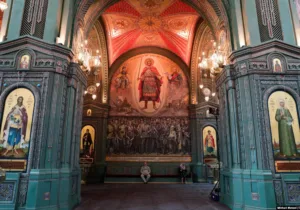On Candlemas this year, or February 2, I sat in choir in Canterbury Cathedral, the historic center of the English church and the seat of the Archbishop of Canterbury, to attend the consecration of the Bishop of Oswestry. Canterbury is the site of St. Augustine of Canterbury’s sixth-century mission to re-evangelize the English people, beginning in Kent. From my seat, I could see not only the throne of Augustine but the large site where Thomas Becket’s shrine once stood. The shrine – once one of the greatest in all of Europe – fell foul of Henry VIII’s reformers in the sixteenth century, as did the tombs of the previous archbishops.
Ever since the English Reformation began, however, the emerging Church of England has attempted to find a way forward to include as much of the English Christian witness as possible within a comprehensive vision. Under Elizabeth I this was known as the “via media,” or the middle way. This attempted comprehensiveness is seen again with the Restoration of the Church and the monarchy under Charles II and even arguably in the aftermath of the 1688 Revolution that enshrined an episcopal church with a common prayer under a Protestant monarch. The Oxford Movement of the nineteenth century expanded that comprehensive vision further in its attempts to recapture aspects of Anglicanism’s catholic heritage. It was amongst its heirs that I sat in February.
The See of Oswestry, an historic episcopal see, has been set aside for traditionalist Anglo-Catholics in the west of England under what is called “mutual flourishing.” Under this program, traditionalist Anglo-Catholics and conservative evangelicals who for theological reasons insist upon male leadership are allowed to flourish within structures that maintain their theological vision. Likewise, mutual flourishing is intended to allow for those who accept male and female leadership to also flourish. It’s not an easy balance for the Church of England to maintain, but they have done so with only minor flare-ups for a number of decades now. Arguably, they have found a way to hold conservative and progressive together, to maintain unity and diversity following in the footsteps of their forebears since the Reformation.
The question, however, is not simply one of ecclesiology within the Church of England but whether or not Anglicanism as a tradition provides a comprehensive vision that overcomes polarization in the public square. It is no doubt clear to anyone who keeps an eye on our public discourse that we are in an age of polarization, even tribalism. This is neither the first time nor the last time that this will be the case, but how can the church – and particularly the Anglican tradition – assist the public square so that ideas of comprehension and/or mutual flourishing become part of the lexicon of public discourse. How, in other words, can our public discourse mirror an ecclesiastical approach that at its core sees value in maintaining constructive relationships of mutual benefit?
Over the course of two days, October 20 and 21, the John Wesley Institute will gather scholars and church leaders at Christ Church, Georgetown here in Washington, DC to address this very question at a conference called Anglicanism vs. Polarization. Those presenting are not of one mind about all of the controversial issues of the day and come from a number of Anglican jurisdictions: the Episcopal Church, the Church of England, the Anglican Church in North America, and the Anglican Church of South Sudan. Each, however, is convinced that Anglicanism offers a way forward in today’s divided world.
Presenters include Baylor University’s David Corey who will argue that the beauty of Anglicanism, particularly its worship, provides a unifier in a fractious age. Marcus Walker, the rector of St. Bartholomew the Great, London will present on the “golden thread” that Anglicanism provides to an increasingly pluralistic English culture. Bishop Patrick Augustine of the South Sudan will speak to the works of mercy, the focus on education, and the comprehensive missional engagement of Anglicanism as a unifying force both for church and for society. King University’s Abigail Cutter will explore how the tradition creates opportunity of hospitality and collaboration across difference, looking at St. Augustine of Hippo and two contemporary Anglican theologians, Oliver O’Donovan and Luke Bretherton.
Ian Markham, dean and president of Virginia Theological Seminary, will argue that embracing fundamental disagreement is an essential characteristic of a healthy Anglicanism, one that overcomes the intolerance of the age. Justyn Terry of Wycliffe Hall, Oxford will explore how Anglicanism can still be a home for evangelical witness, thus exemplifying that comprehensiveness that is needed in the public square.
These and other presentations will help us to explore the riches of an historic tradition but in this case not for its own sake but for the sake of larger social and societal harmony, discourse, and engagement, therefore exemplifying the very words of the Litany found in the Book of Common Prayer that God may “give to all nations unity, peace, and concord.”
Register for the Anglicanism vs. Polarization Conference at: https://nextmethodism.org/the-anglicanism-vs-polarization-conference/






 Sponsor a student for Christianity & National Security 2024
Sponsor a student for Christianity & National Security 2024